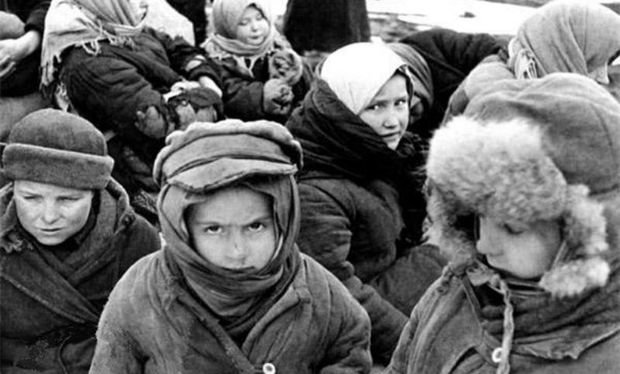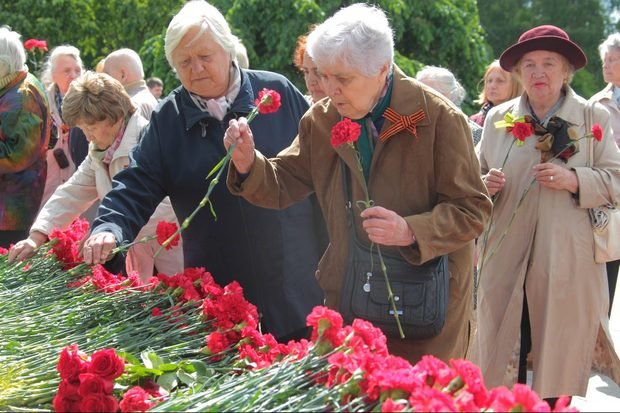Vsevolod Chaplin: ''The siege time bred many sins and crimes''
‘‘Too little’’ survivors of the siege? Archpriest Vsevolod Chaplin’s column
More than a thousand of citizens of Petersburg who were born in sieged Leningrad after 27 September 1943 don't have the right to receive federal benefits. Moreover, some people consider them almost ''whores' children''. In the column written for our online newspaper on the threshold of Victory Day, Realnoe Vremya's columnist Archpriest Vsevolod Chaplin asks whether the ''children of the siege'' deserve such an attitude.
Moral issue
People have been writing me about a problem for several months already that seems to be elementary but that hasn't been solved for years: the ''children of the siege'' who were born after 27 September 1943 don't have the right to received benefits entitled to other people survived in the siege. Including to additional medical care. As we are talking about federal benefits, the Saint Petersburg Legislature has introduced bills enabling to fix the situation to the State Duma twice. Both attempts failed. The project is prepared by the Legislature's Commission for Veterans' Affairs, which decreed to introduce it for consideration to the urban legislature in March. Will the issue be put into motion now?
The petition in this respect published on the site Russian Public Initiative says: ''The necessity to eliminate the unjustified discrimination of a part of citizens of sieged Leningrad was repeatedly mentioned in explanatory and other supporting documents to bills at both the regional and federal levels, neither of which was adopted despite repeated justified addresses of citizens''. It also includes the award ''To Resident of Sieged Leningrad'' given to children of the siege.
The old problem isn't technical but moral. The Leningrad Urban Executive Committee adopted a regulation as early as 1989 according to which only people who lived in the sieged city for no less than 120 days have the right to the benefits.
There is some logic in it, of course. A person who was detached and arrived in Leningrad for a week or more and who was usually in the custody of the state is unlikely to be levelled now to those who were in the city constantly. But the children who were born on those terrible days probably had to suffer the most. Many of them didn't survive, many of them were born premature, they all were weak. If we believe nurses, almost every such person's health was affected. By getting old, which was a long time ago, infirmities aggravated.

''The children who were born on those terrible days probably had to suffer the most. Many of them didn't survive, many of them were born premature, they all were weak. If we believe nurses, almost every such person's health was affected.'' Photo: bigpicture.ru
The case of 2,000 people
However, there is another opinion: ''It's whores' children, sane women didn't give birth during the siege''. I don't think somebody has the right to say about every woman of that time this way. But even if something similar happened, and even if children don't pay for consequences of their mothers' sins in virtue of education, is it a reason to refuse to help old people who probably repented for both theirs and their parents' sins? By the way, the siege time bred many different types of sins and crimes. For instance, one good-looking old man confessed me – with repentance but also with self-justification – he ate human meat then. And even he has a chance to be forgiven by God. But it's unlikely that somebody of the survivors of the siege will dare to claim: ''We suffered more, and the people born in September 1943 can't be compared.''
By the way, we are talking about 2,000 people only. They are ill and very old. In this case, not the logic of economic calculations but the logic of compassion must work. Even if it is ''illogical''. However, let's try to talk about the economic aspect of the issue. The presupposed costs are equal to 39 million rubles a year. In general, the sum isn't small. But Chairman of the Legislature's Commission for Veterans' Affairs Igor Vysotsky reasonably says: ''More than 10,000 survivors of the siege die in our Saint Petersburg every year. And the money designed in the federal and local budgets for it becomes free.''
However, there is one and the same key phrase in opinions of the government of Russia about the mentioned bills: the budget money ''for the given purposes aren't presupposed''. And the authors of the bill are offered to independently determine the sources of financing – as if it was not the job of the economic block of the government but that of the State Duma or Petersburg Legislature. Mercy crashes against calculations again. And we can presuppose the updated economic block will write the same opinion about the new analogous bill if it reaches Okhotny Ryad.

''By the way, we are talking about 2,000 people only. They are sick and very old. In this case, not the logic of economic calculations but the logic of compassion must work.'' Photo: topdialog.ru
''Natural reasons''
The conclusion of the government as from 2013 has one counter-argument that seems to be reasonable based on the Ministry of Labour's opinion: ''The expansion of the mentioned persons can result in analogous addresses from citizens of other categories who don't have such a right''. However, the bill was sporadic. It was sent to restore the fair attitude to the children of the siege only, and nobody else.
Many beautiful and correct words have been said these days about the respect for veterans of war, memory of all its victims. And it's very important not to forget about those victims who are still among us. About the people whose first months of life and then whole childhood, youth as well as the next years were linked with illnesses and mental agony bred by the siege. I'm convinced an exception from general rules can be made for them and explain ''other categories of citizens'' moral foundations of such an exception.
To put it mildly, it's not nice to wait for the time when the voice of these people stops being heard for ''natural reasons''. Now it sounds. For instance, this is what Valentina Fedoseyeva, who was born in Leningrad on 23 October 1943, writes in Petersburg's Legislature: ''I bow to the bravery of all Leningrad mothers. My mother lived and worked in defence for Victory in the sieged city during the war, what she had awards for, including the medal ''For Defence of Leningrad''. She left the kid and gave me the most valuable thing – life – in a tough cold and hungry time. What criteria can estimate every day of the siege lived by an unprotected child?''